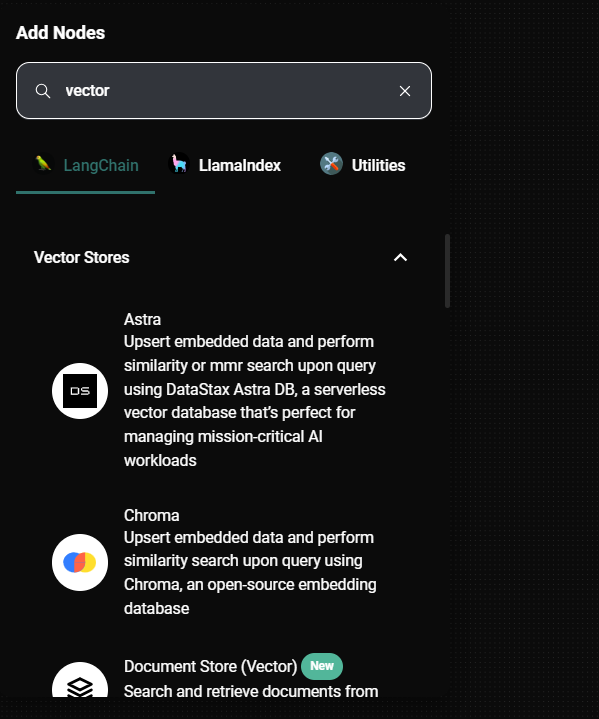Vector Store Nodes
Overview
Vector stores are essential components in modern AI and machine learning systems, particularly in applications involving natural language processing, image recognition, and recommendation systems. They are specialized database systems designed to efficiently store, manage, and retrieve high-dimensional numerical vectors.
Why Vector Stores are Needed
-
Efficient Similarity Search: Vector stores enable fast and accurate similarity searches, which are crucial for tasks like finding similar documents, images, or user preferences.
-
Scalability: They can handle large volumes of high-dimensional data, making them suitable for big data applications.
-
Optimized for AI/ML: Vector stores are tailored for machine learning models that work with embeddings, facilitating seamless integration with AI systems.
-
Real-time Processing: Many vector stores support real-time updates and queries, essential for dynamic applications.
What are Vector Stores?
Vector stores are databases that specialize in:
-
Storing Vectors: They efficiently store high-dimensional numerical representations of data (vectors).
-
Indexing: They use advanced indexing techniques to organize vectors for quick retrieval.
-
Similarity Search: They provide fast and accurate methods to find the most similar vectors to a given query vector.
-
Integration: They often offer APIs and integrations with popular machine learning frameworks and tools.
Vector Store Nodes in AnswerAI
AnswerAI provides a variety of vector store nodes that can be added to the canvas of Sidekick workflows in the Sidekick Studio. Each of these nodes represents a different vector store solution, offering unique features and capabilities.
Available Vector Store Nodes
-
- A cloud-native database built on Apache Cassandra, optimized for vector search.
-
- An open-source embedding database designed for AI applications.
-
- A distributed search and analytics engine with vector search capabilities.
-
- A library for efficient similarity search and clustering of dense vectors.
-
- A lightweight vector store that operates entirely in memory for fast performance.
-
- An open-source vector database built for scalable similarity search.
-
- A multi-cloud database service with vector search capabilities.
-
- A community-driven, open-source search and analytics suite with vector support.
-
- A fully managed vector database designed for machine learning applications.
-
- An open-source relational database with vector storage and search extensions.
-
- A vector similarity search engine with extended filtering support.
-
- An in-memory data structure store with vector similarity search capabilities.
-
- A distributed SQL database that supports vector operations.
-
- An open-source Firebase alternative with vector storage and search features.
-
- A fully managed vector database optimized for serverless and edge computing.
-
- An AI-powered search platform with vector search capabilities.
-
- An open-source vector database that allows for semantic search.
-
- An open-source memory store for LLM applications with vector search features.
-
- A cloud-hosted version of the Zep memory store for LLM applications.
Each of these vector store nodes offers unique features and integrations within AnswerAI, allowing users to choose the most suitable solution for their specific use case and requirements.

Vector Store Nodes & Drop UI